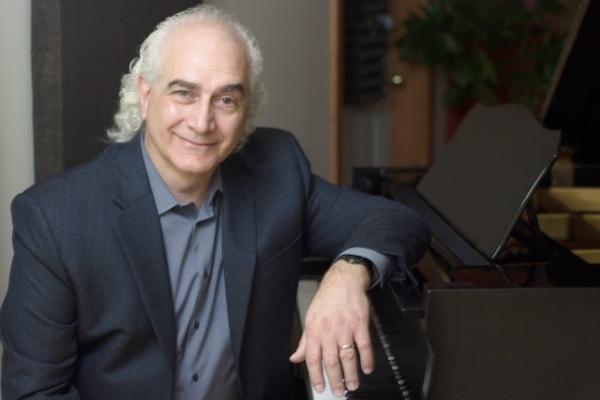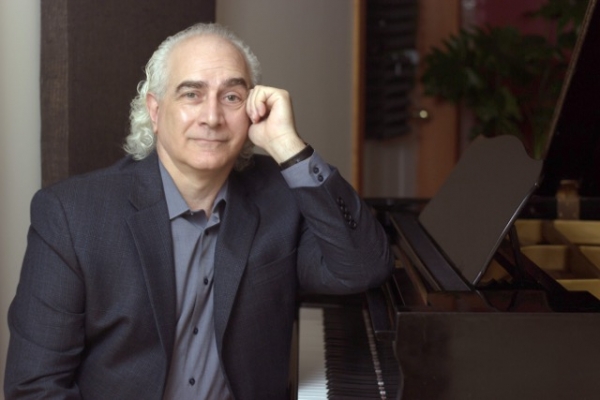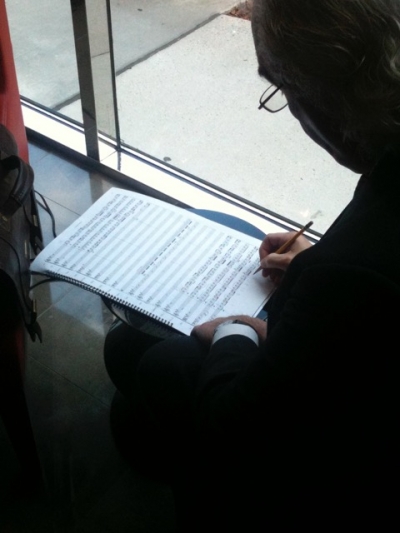Louis Anthony deLise released his first album as a solo artist,
Natural Light, in 2019, but he is no newcomer to the music industry. He has worked “behind the scenes” on a staggering number of recordings by other artists in a wide variety of music genres as a studio musician, a composer, a conductor, an arranger and a producer. He is also a professor and an author. So, without further ado, I’d like to introduce you to Louis Anthony deLise! We did this interview in early January 2020. Enjoy!
KP: Greetings, Louis! I trust 2020 is off to a good start for you?
LAd: Hello, Kathy. The New Year is off to a great start with this interview!
KP: Thank you! I’ve been looking forward to doing this interview, too!
Despite a lifelong career in music, 2019 was a very big year for you with lots of firsts! I was introduced to you and your music via your first album as a solo artist, Natural Light, which is mostly piano but also has a few other instruments included. It was also one of my favorite albums of 2019. How did that album come about?
LAd: You’re very kind—knowing that you like my work means a lot.
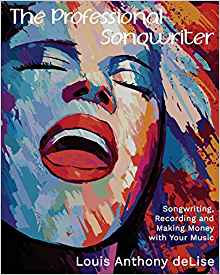
Click on images to go to Kathy's reviews.
Yes, I’ve been fortunate enough to have a career in music from a very early age. Most of that work has been as a mostly anonymous member of orchestras that accompanied stars, as an arranger for symphony orchestras, or as the credited arranger, conductor, and later—producer—of recordings in various genres. I’ve worked projects in every style from contemporary classical to rock, including various "species” of pop, like smooth jazz, alt rock, and singer-songwriter.
Over the years, I also wrote a lot for production music libraries and a great deal of music for advertising. As you can see, mostly all of this work is for the most part out of the spotlight.
Natural Light was instigated by a phone call from my niece, Andrea, who works as a licensed massage therapist. She called me one afternoon about three years ago to say something like, “Uncle Lou—can you please record some music that is better than the stuff they play here where I work?”
I did some research—actually, Andrea sent me a playlist of tracks she loved—and I began to compose and record new pieces "around the edges" of my other commissioned studio work.
KP: It’s interesting how life works sometimes!
Did you release the solo piano version of Natural Light, too?
LAd: Indeed I did. The solo piano version of
Natural Light is available for download only at my
website. Buy it
HERE
KP: And there is a lovely companion solo piano songbook as well!
LAd: Yes. My publisher, Metropolis Music Publishers (in Belgium), has released a beautiful book of the solo pieces, plus one bonus piece.
KP: Was your concerto for flute, Salone del Astor, released in 2019, too?
LAd: Well, yes and no!
I was commissioned in 2018 by the flutist, Joan Marsh Sparks, to compose Salone for flute with vibraphone accompaniment. The piece was premiered at the 2018 convention of the National Flute Association (NFA) in Orlando that August. My other publisher, ALRY Publications, released the piece in print then.
Then, in 2019, Ms. Sparks came back to me to ask if I would re-write the accompaniment for piano since she then had an opportunity to perform the piece with piano accompaniment. I did that and ALRY released the version with piano accompaniment in the summer of 2019. Coincidentally, the NFA honored us with an award in 2019 for “Best Newly Published Mixed Duet.”
KP: Congratulations! I’d really like to hear that music sometime! On top of all that, you released a new book, The Professional Songwriter, a very detailed and thorough handbook on songwriting suitable for classroom or individual use. It’s a fascinating and well-written book with lots of info from the perspective of someone who has spent many years in the field.
LAd: Thank you, Kathy!
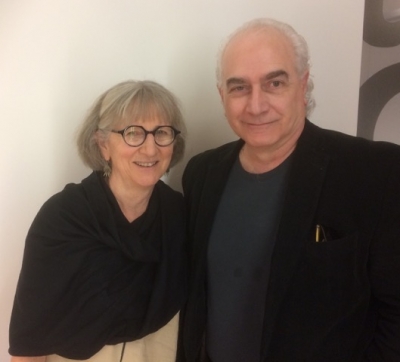
with Nancy Rumbel, who played on Natural Light
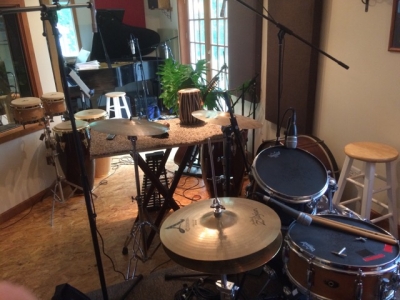
Louis' studio
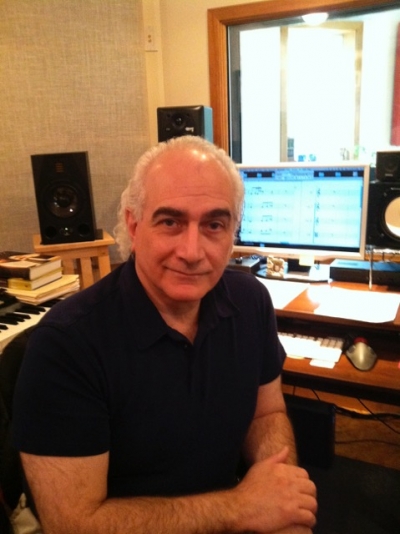
in the control room
KP: How did writing the book come about? Have you written other books, too?
LAd: I have contributed to other text books, and have written magazine articles. From my work with aspiring songwriters, I recognized the need for a comprehensive text on the subjects of song craft and songwriting business.
KP: Do you teach classes in songwriting as well?
LAd: Yes. I was for several years Adjunct Lecturer in Composition and Theory at the Boyer College of Music and Dance at Temple University in Philadelphia. I created the course in pop songwriting there and taught it along with classes in theory, composing for film, and arranging for jazz band.
KP: Wow! You really have “done it all,” haven’t you?
You mentioned that you have new music coming out this spring. Can you tell us a bit about that?
LAd: You know, I’m only slightly superstitious about discussing stuff before I write it, but since it’s just “us” here, I’ll answer—yes! My plan is to release a new album of solo piano works this spring. I am simultaneously developing an album of flute and harp recordings.
KP: Sounds intriguing! Let’s talk about your life and career since you have done so many things in the music field. Where were you born and where did you grow up?
LAd: I was born in the Olney section of Philadelphia. Our family moved to Warrington, Bucks County when I was six. So, I had the fantastic opportunity of growing up in the country. (Warrington is about 25 miles north of Philadelphia and was at the time quite rural. It is a very interesting area, by the way. The authors Pearl S. Buck and James Michener and the lyricist, Oscar Hammerstein, all had homes nearby. And, New Hope, also fairly close to my childhood home, is a wonderful arts community.)
KP: It sounds like a great place to grow up! When did you start playing music?
LAd: My first memory of playing anything is of me figuring out how to play “Silent Night.” I was about seven when I spent the Christmas holiday in the Shriners Hospital in Philadelphia. There was a kindly teacher there who loaned me a set of toy bells. I pounded on those things, relentlessly, until I could play the old German tune!
KP: Auspicious beginnings, right?
LAd: Quite.
KP: When did you start music lessons?
LAd: I believe I was about eight years old. I began with drum lessons at the local high school and then progressed to private drum lessons at my home. There was a piano in our home, so at about the same time I started playing tunes by ear and making up tunes at the piano. I took music theory lessons from my drum teacher and applied that training to my composing. I began serious (classical) piano studies as a senior in high school and continued with lessons through the first three years of undergraduate work.
KP: Interesting! Which instruments do you play besides piano?
LAd: My undergraduate degree is in Composition and Orchestral Percussion, so I’m a good all-around percussionist. I play the mallet instruments (like vibraphone and xylophone), tympani, orchestral snare drum, hand drums, and of course, drum set. I have played piano or keyboards on mostly all the records I’ve produced or arranged. Today, most of my work in the studio also includes playing what I call the “MIDI Array.”
KP: When did you start writing music?
LAd: (Peter Nero, for whom I worked for 22 years, had a great answer to this kind of question. Pete would look at his watch and then say, “Let’s see. What time is it now?”) I began making up tunes at the family piano when I was about eight years old.
KP: Who and what do you consider to be the major influences on your music?
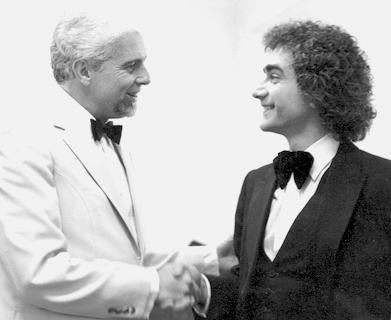
with Peter Nero (on left)
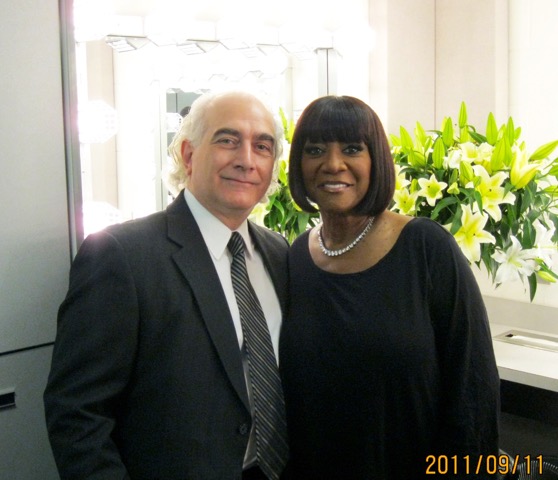
with Patti LaBelle
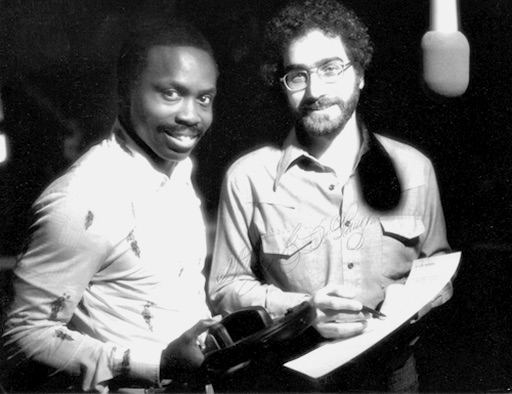
with Wiliam DeVaughn
LAd: There are many whose music I admire for different reasons. These creators include, J.S. Bach, G.P. Telemann, Antonio Vivaldi (for the intricacy of their design) George Shearing, Henry Mancini, Stan Kenton (for their sense of harmony and chord voicing), Thelonious Monk (for his individuality), Jimmy Smith (the organist), and Louis Prima (the great New Orleans musician) (for their sense of “groove”), Dave Brubeck (for his sense of meter, originality and personality), and Michel Legrand (for his great melodic gift). Oh, and of course, Claude Debussy, Giacomo Puccini, Maurice Ravel, and Ottorino Respighi—(because of the sheer beauty of their hearts––that beauty shines through their music. It’s so moving!}
KP: An eclectic group - no surprise! Where did you go to college?
LAd: I did both my undergraduate and graduate work at what is now called The Boyer College of Music and Dance at Temple University.
KP: I know you earned your Doctor of Musical Arts (D.M.A.). Have you taught at the college level as well?
LAd: I have. My career has always been divided between writing, performing, and teaching. Always…
It was common for me to rehearse or perform with Opera Philadelphia or some other show or concert, write an orchestra arrangement for Peter Nero, conduct a record date, and teach a class or two—all in the same week! So, my teaching has always been just some of my work week. That said, I was Adjunct Lecturer at Boyer, as I mentioned, and at different times I taught music theory, composition, jazz history and other classes at Pennsylvania State University and Rowan University in addition to my work at Temple’s Boyer College.
KP: You have worked on recordings by an amazing variety of artists from many genres. What are some of the more memorable experiences you’ve had?
LAd: I have been very, very fortunate to compose, arrange, perform and conduct on records released on major labels, including Vanguard, Centaur, Casablanca, EMI, CBS, Universal, and many others. I’m playing percussion on a record with Peter Nero. I arranged and conducted for the great Bunny Sigler on an album that features Paul Shaffer on electric piano. I produced, arranged, conducted, and played piano and vibraphone on a hit album for William DeVaughn (Figures Can’t Calculate) that yielded three Billboard chart records. I arranged and conducted for the great band Halestorm, and of course I arranged and conducted two best-selling albums for Miss Patti LaBelle: Timeless Journey and The Gospel According to Patti LaBelle, which was at number one on the Billboard Gospel Chart for about eight weeks.
Other composing, arranging, conducting or performing credits are on albums that also feature the work by artists including Carlos Santana, Wynonna Judd, Kanye West and others.
KP: Have you written and/or conducted much music for television and/or films?
LAd: Yes, quite a bit! I was creative director at a music-for-advertising company for about twenty years, concurrent with my work as a percussionist and arranger for maestro Peter Nero. During my tenure at the production company, I wrote many jingles, music library tracks, and scored probably a hundred short films. Our clients included McNeil Pharmaceuticals, Pep Boys, Sunoco, DuPont, Coca-Cola, Bristol-Myers Squibb, and lots of small companies, too..
KP: On a very different “note,” it seems that a lot of people I talk to or correspond with who have extensive backgrounds in classical music have a very low opinion of pop, new age, or most music that isn’t considered classical. Obviously, that isn’t the case with you. Have you taken a lot of flak for your embrace of many genres of music?
LAd: YUP!!! There are many, many music snobs in the world: classical folks who don’t consider anything worthy unless it evolved from the Second Viennese School, and jazzers who think that almost anything other than music from the Bebop Era is just not quite hip enough!
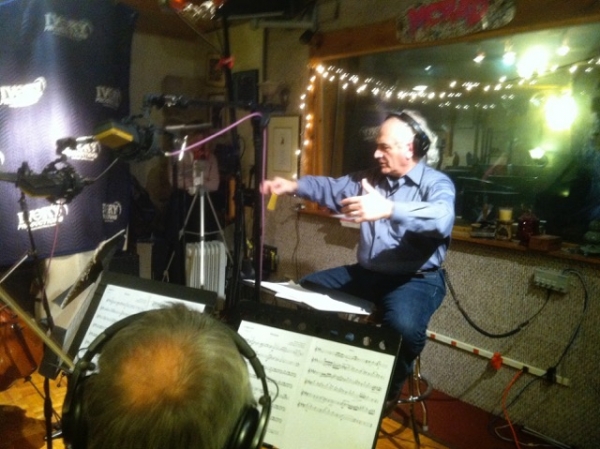
conducting a recording session
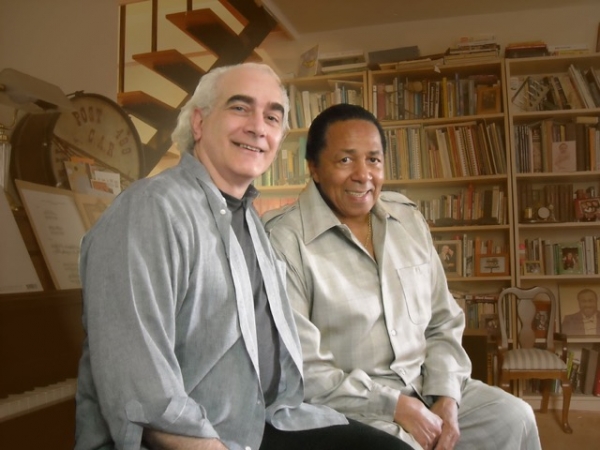
with Bunny Sigler
Not me! I subscribe to the Duke Ellington philosophy. Maestro Ellington said, “There are two kinds of music. Good music, and the other kind.” Therefore I can certainly enjoy, and even revere, the compositions of Ned Rorem or Dolly Parton or Igor Stravinsky or Jimmy Webb or Billy Joel pretty much on an equal footing.
KP: I love Ellington’s quote and very much agree! I also love the line in The Blues Brothers film where one of the singers says: “We play both kinds of music - Country AND Western!”
LAd: That’s a good one, too!
KP: I’ve read that your compositions are performed all over the world. What are some of your most-performed works?
LAd: The most performed works are likely from a collection of “Miniatures” I composed in 2019. I was commissioned to compose one short piece for flute and harp for each month during all of 2019. These pieces (published worldwide by ALRY Publications), have been very well received and performed a lot during this year. I hope to record some of these myself this year and a couple are being recorded by a duo in Australia, too. (ALRY lists the pieces
here.
KP: Has much of your music been recorded, too? (Other than the albums we’ve mentioned before.)
LAd: Wow…yes, indeed—a lot! Let’s see, I had my first “Pick Hit” in Billboard back in the mid-1970’s…and I really haven’t stopped since! My most successful stuff—albums with William DeVaughn (three chart records), Patti LaBelle (two major charted albums), and John Gibbs (re-released on several labels); favorite albums—smooth jazz/smooth R&B projects with my studio band I call Philly Nouveau and another with a really fine singer named Josi Davis.
KP: With irons in so many different fires, what are some of your upcoming projects?
LAd: I have an agreement in place with one of my publishers to revise and publish a concerto for marimba and orchestra (they want a piano reduction of the orchestral score). I’m beginning the solo piano album I mentioned earlier, and I am in talks with a flutist to record some of my flute and harp miniatures. I’m presently engaged by a singer-songwriter to produce and arrange his next couple singles. Other than that, I’m pretty open! What did you have in mind? (LOL)
KP: Hahaha! In the songwriting book, you advise composers and songwriters to compose every day whether they feel inspired or not. I think most people think that composers and writers (of all kinds) need to feel inspired to create anything worthwhile. I’m sure there are times when inspiration hits and everything flows, but your advice is to more or less exercise those creative muscles as a part of a daily routine. Can you explain that a bit?
LAd: Well, the answer to your fine question is complicated. It occurs to me that we are "creatures of habit.” I think that it is helpful, indeed important, therefore to establish the habit of composing. This is for a bunch of reasons, not the least of which is that composing is a sometimes lonely process and something we can very easily put off. There are ALWAYS other things to do that "just need to get done” or are simply easier—you know, like going out for breakfast at a greasy spoon, or checking one’s e-mail, or looking at the evil social media feeds! Composing takes a degree of discipline. It is work, but man is it cool to hear the fruits of one’s labor played back in the studio or in a concert hall!
Please disregard the fact that I chose to begin answering your questions early this morning, you know—rather than sitting down at the piano to ruminate. (LOL) The truth is that as supposedly creative folk, we need the distraction and stimulation of taking in other art, including what I consider the “accidental art” of observing other person’s lives. While it’s obvious on its face, it is important to be in the world, too, and not just sequestered away in one’s studio. Still, the discipline of trying to write a little each day is a great way to polish one’s craft, and it is (I think) not only creativity, but also craft that differentiates the great composers from the also-rans. So, today and for the past several days, I have been observing a kind of musical interregnum. I just finished a really large couple composing projects and I’m recharging my creative battery!
KP: That makes so much sense! Thank you!
Who are some of your favorite performers?
LAd: Yo Yo Ma, James Taylor, Dave Brubeck, Jimmy Smith, Howard Levy, and Joe Morello in no particular order.
KP: What has been your most exciting musical moment to date?
LAd: In 2011, I was commissioned to write an orchestral arrangement for Patti LaBelle of a song that my older son, Jonathan, wrote. The orchestration was performed by the Marine Orchestra and Miss LaBelle at the Kennedy Center for the commemoration of the 9/11 attack (A Concert for Hope). President and Mrs. Obama, Vice President and Mrs. Biden and many members of Congress were in attendance for the national broadcast of this performance. (As impressive and memorable as was performing at Carnegie Hall with Peter Nero and Mel Tormé, or touring the country, or performing on other nationally broadcast television programs—this was about as hip as it gets!)
KP: Wow!
Is there anything else you’d like to talk about?
LAd: Only that I am very happy that my niece challenged me to “write something better than what they played” at her work. This caused me to realize that at least some of the music I’ve been making for myself—for years—actually fits nicely into the ambient space. Also, I find the “family” of musicians in this space to be very creative, accomplished, and quite accepting. That’s really special.
Many thanks to Louis Anthony deLise for taking the time for this interview. For more information about Dr. deLise and his music, please visit
his website and his
Artist Page here on MainlyPiano.com.
Kathy Parsons
January 2020

